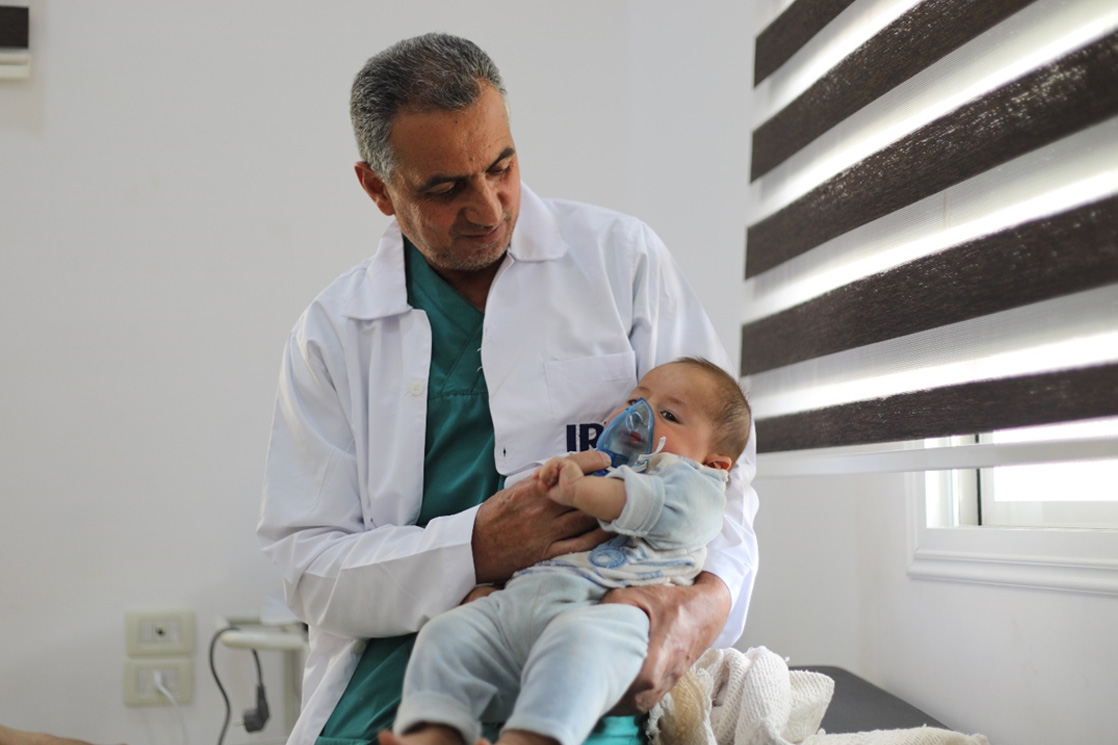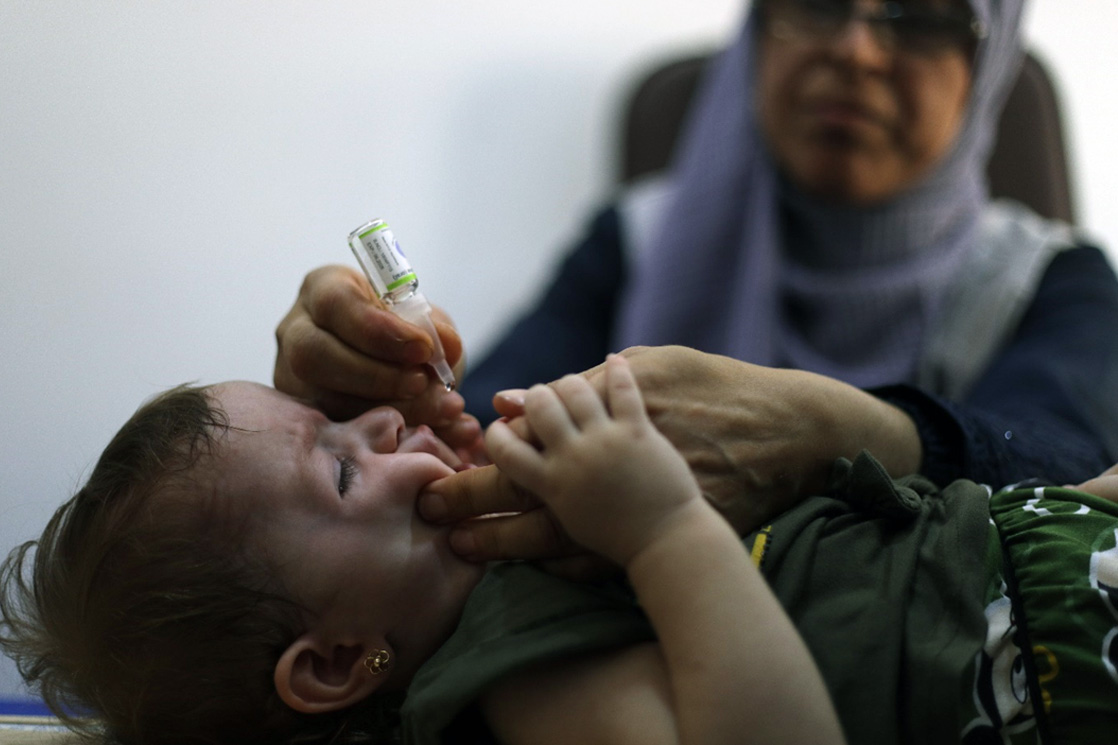 Dr Jaber Al-Omar examines a young patient at Ma’arrat An Nu’man public health centre which now records more than 1,200 paediatric visits each month. Photo credit: WHO18 September 2025, Idlib, Syrian Arab Republic – After years of disruption, the Ma’arrat An Nu’man Primary Health Centre has been steadily rebuilding itself as a central point of care for thousands of families returning to their city. For people who endured years of conflict and displacement, the Centre is more than a building – it is a sign of stability.
Dr Jaber Al-Omar examines a young patient at Ma’arrat An Nu’man public health centre which now records more than 1,200 paediatric visits each month. Photo credit: WHO18 September 2025, Idlib, Syrian Arab Republic – After years of disruption, the Ma’arrat An Nu’man Primary Health Centre has been steadily rebuilding itself as a central point of care for thousands of families returning to their city. For people who endured years of conflict and displacement, the Centre is more than a building – it is a sign of stability.
Among the health workers anchoring this recovery is Dr Jaber Al-Omar, a paediatrician who now treats more than 1200 children each month. “Many of the children I see are malnourished or suffer from recurring infections,” he explained. “But what families need most is reassurance – to know that care is available close to home.” His calm presence has earned the trust of parents, who say his work gives them both hope and confidence.
At the pharmacy, Saddam Al-Abbas manages the supply of essential medicines with meticulous care. In one recent emergency, when a child arrived struggling to breathe, Saddam drew from a reserve stock he had set aside for such moments, ensuring the boy received immediate treatment. “In these conditions, medicine is not just about healing,” he said. “It is about survival – making sure no one is left without what they need at the right time.”
Meeting overwhelming demand
 Pharmacist Saddam Al-Abbas prepares essential medicines for patients, ensuring continuity of treatment even during emergencies. Photo credit: WHOSince reopening in May 2025, the centre has been overwhelmed by demand. In its first week alone, more than 1800 consultations were carried out. The emergency unit managed over 600 urgent cases, while the midwifery team supported more than 300 women.
Pharmacist Saddam Al-Abbas prepares essential medicines for patients, ensuring continuity of treatment even during emergencies. Photo credit: WHOSince reopening in May 2025, the centre has been overwhelmed by demand. In its first week alone, more than 1800 consultations were carried out. The emergency unit managed over 600 urgent cases, while the midwifery team supported more than 300 women.
“Sometimes I feel the number of patients will never end,” said Ahlam, a midwife at the centre. “But I remind myself that every mother we care for safely, every child we vaccinate, is part of rebuilding this community.”
Supported with trained staff and a stocked pharmacy, the health centre has exceeded projections while maintaining safe consultation loads in line with international standards. A 10-bed emergency unit functions around the clock to stabilize trauma and obstetric emergencies, while referral protocols and two dedicated ambulances ensure that critical patients reach hospitals in Idlib within two hours.
Caring for the whole person
 A paediatrician at the centre provides urgent care to an infant with respiratory distress. Photo credit: WHOAlongside physical health services, the centre now offers dedicated mental health and psychosocial support. Trained counsellors provide safe spaces for people to talk about their struggles – from children showing signs of trauma to parents overwhelmed by the challenges of displacement and return.
A paediatrician at the centre provides urgent care to an infant with respiratory distress. Photo credit: WHOAlongside physical health services, the centre now offers dedicated mental health and psychosocial support. Trained counsellors provide safe spaces for people to talk about their struggles – from children showing signs of trauma to parents overwhelmed by the challenges of displacement and return.
“People used to say mental health did not matter when you are trying to survive,” said one counsellor. “But now patients come to us and say: ‘I cannot sleep, I cannot stop worrying.’ They realize their minds need care too, not just their bodies.”
Strengthening systems for the future
The centre is also playing a role in protecting public health. By reporting weekly data through WHO’s Early Warning Alert and Response System (EWARS), it helps detect and respond to threats such as measles or cholera before they spread. This vigilance is vital in a region where outbreaks can quickly overwhelm fragile health systems.
Crucially, the centre has reduced reliance on mobile units by restoring a permanent, facility-based model, ensuring reliable access to care.
Partnerships driving recovery
 A health worker administers an oral vaccine to a young child at Ma’arrat An Nu’man PHC, which also has a dedicated EPI section. Photo credit: WHOThe rehabilitation of the Ma’arrat An Nu’man Primary Health Centre was made possible through support from Gavi, the Vaccine Alliance, working with WHO, the Ministry of Health and the District Health Directorate. Together they restored the physical infrastructure and anchored service delivery within national systems.
A health worker administers an oral vaccine to a young child at Ma’arrat An Nu’man PHC, which also has a dedicated EPI section. Photo credit: WHOThe rehabilitation of the Ma’arrat An Nu’man Primary Health Centre was made possible through support from Gavi, the Vaccine Alliance, working with WHO, the Ministry of Health and the District Health Directorate. Together they restored the physical infrastructure and anchored service delivery within national systems.
Operational costs are covered by the European Union (EU), through its Civil Protection and Humanitarian Aid Operations (ECHO), enabling WHO and Al Ameen to keep the centre fully functional. The center provides essential health care services, including outpatient consultations, normal and emergency obstetric, and ambulance services. Al Ameen, a WHO health partner, manages day-to-day operations, ensuring that care reaches families consistently and safely.
A sign of recovery
 Outside view of the centre, where families gather daily to access emergency, maternal, and child health services in a city where most infrastructure remains damaged. Photo credit: WHOFor families returning to Ma’arrat An Nu’man – a city where 90% of infrastructure remains damaged and no secondary care exists within 45 km – the centre’s revival has brought back a sense of stability.
Outside view of the centre, where families gather daily to access emergency, maternal, and child health services in a city where most infrastructure remains damaged. Photo credit: WHOFor families returning to Ma’arrat An Nu’man – a city where 90% of infrastructure remains damaged and no secondary care exists within 45 km – the centre’s revival has brought back a sense of stability.
“Every consultation here is a message to the community that they are not forgotten,” Dr Jaber reflected. “We are rebuilding trust, one patient at a time.”








